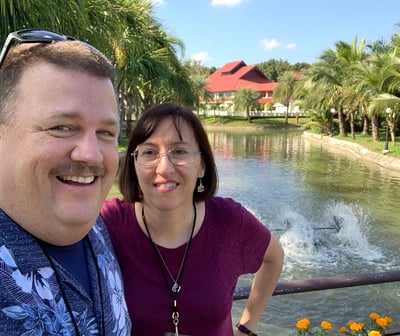Drawing Near to God


This blog is going to be a little different. Let me explain. In January, I was given a wonderful gift: the opportunity to travel with my wife on a two-week retreat in Thailand. This was not a mission trip but instead a true time away of intentional retreat. As the end of 2018 approached, I came to realize this last year was very hard on me. My compassion fatigue was quite high. My resilience was also quite low. So, when given an opportunity to get away to pray, worship, read, and listen to God, I knew I must go, even if it was on the other side of the planet.
The worship was great. In the first half of the retreat, I took time to focus on my relationship with God. And it was very good. I had time to reflect on some of the things that happened this last year, along with some things from a time long ago, as well as my reactions to them. It was a time for repentance, healing, and a fresh perspective: His perspective.
Chaplains aren’t usually called when things are going well. As a chaplain, I hear a lot of complaints. The constant drip can be hard on chaplains, which was a big thing that wore me down in 2018. The drip was affecting my heart and mind. I like being a man of action, and I hate to see injustice, but I felt I could do nothing with the complaints about life people were giving me… except to take them on (and, of course, pray). That, coupled with the traumas I was involved with in my role as a chaplain, brought me to a point where I was so exhausted (fatigued) that I had a hard time getting a godly perspective.
Taking time off and getting away has a way of helping us draw near to God. Here are a few insights from my time away. Who knows, maybe some of these will turn into blog posts in 2019.
1. God’s compassion is a secondary characteristic to His holiness.
I have been so wrapped up in His compassion this last year that I needed to refocus on His holiness. I was reminded that there will be no need for chaplains in heaven because there will be no pain and suffering. Only God's holiness.
2. A compassionate life means living on “God time,” not as a slave to “clock time.”
At times, I struggle with removing myself from clock time when my employers make me work in clock time. God's time removes time constraints when being with people. However long it needs to take, that is how long it will take. He dictates when interactions are and how long they last, not me.
This is something that I will continue to have to work on. My personality (ENFJ) finds much comfort in being in control and on clock time. To learn to appreciate God's time stretches me. I realize that when I choose my schedule above people, I no longer show compassion. This is very hard for me when I live in a clock-time world. But pulling myself out of clock time and into God's time gives me a fresh insight into God and how He views the world. I must remember that the interruptions in life are not part of the job; when you are a crisis chaplain, interruptions are the job.
3. Words of blessing are powerful and empower others.
This was something presented to us at the retreat. How do I incorporate giving a blessing to others as a crisis response chaplain? How do I incorporate it into my role with the South Carolina Public Safety Chaplains Association? I plan to grow in this area through 2019.
4. Compassion is not about being heroic.
Compassion is all about others. In contrast, being heroic is all about glory for self while doing something for somebody else. Likewise, suffering, as an end, is about self. Suffering should be a side note in the believer’s life, even though suffering is very real.
5. The most compassionate action is prayer.
Prayer joins us with a compassionate God for others who need an intervention. In prayer, we bring others to God, the healer of all. Prayer makes us stop and join in with those we are praying for and directs us to pay attention and be aware of their needs. Good prayer is not what is on our agenda but, instead, what is driven by the unique needs of others as they need to encounter the living God.
6. A life of compassion shows God’s power.
Finally, compassion is not a way to show we are powerful or in control but to show awareness of God’s power. The greatest act of compassion was that Jesus died for us and rose again. As a chaplain, I desire to let that compassion flow through me.
